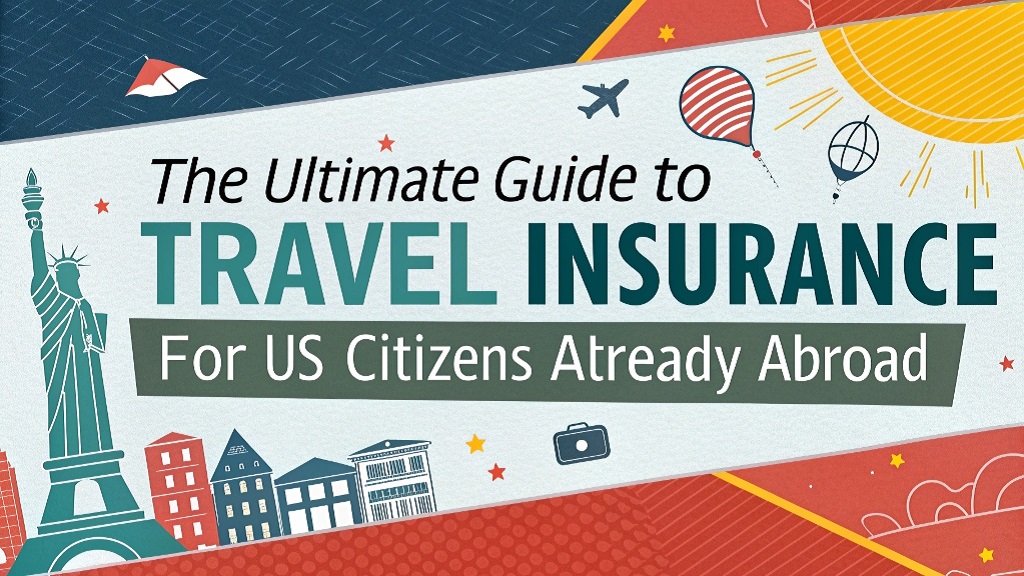Travel insurance for US citizens already abroad offers a safety net for unexpected challenges. Imagine exploring vibrant markets in Thailand or hiking the Alps, only to face a medical emergency or lost luggage. Travel insurance ensures you’re covered, no matter where you roam. Whether it’s a sudden illness, trip cancellation, or stolen belongings, having the right policy brings peace of mind. According to a 2023 study by the US Travel Insurance Association, 65% of travelers faced disruptions abroad, highlighting the need for protection. This guide shares my own story of navigating travel insurance while overseas, offering practical tips to help you choose the best coverage. Let’s dive into why travel insurance for US citizens already abroad is a must-have.
Why Travel Insurance Matters When You’re Already Abroad

Travel insurance for US citizens already abroad is essential for unforeseen events. Unlike domestic policies, international coverage addresses unique risks like medical evacuations or trip interruptions. For example, a sudden illness in a foreign country can lead to hefty medical bills. Without insurance, you might face financial strain. Additionally, coverage can include lost baggage, flight delays, or emergency repatriation, ensuring you’re not stranded.
My own experience in Peru taught me this lesson. While hiking Machu Picchu, I sprained my ankle, requiring urgent care. Thankfully, my travel insurance covered the hospital visit, saving me thousands. According to a 2024 report by Allianz Global Assistance, 70% of claims filed by US travelers abroad were for medical emergencies. Therefore, securing travel insurance for US citizens already abroad is a smart move to avoid unexpected costs and stress.
Types of Travel Insurance for US Citizens Abroad
Travel insurance for US citizens already abroad comes in various forms, tailored to your needs. Comprehensive plans cover medical emergencies, trip cancellations, and lost belongings. Medical-only plans focus on health-related issues, ideal for healthy travelers. Additionally, evacuation plans ensure safe transport during crises, like natural disasters. Each type serves a purpose, depending on your travel style and risks.
For instance, during my stay in Japan, I opted for a comprehensive plan. It covered a canceled flight due to a typhoon, saving me from costly rebooking fees. A 2023 survey by Squaremouth found that 60% of travelers preferred comprehensive plans for flexibility. Therefore, evaluate your itinerary and health needs before choosing. Compare policies to find the best fit for your journey.
How to Purchase Travel Insurance When Already Abroad
Buying travel insurance for US citizens already abroad is trickier but possible. Most insurers require purchase before departure, but some offer mid-trip coverage with restrictions. Look for providers like World Nomads or Allianz, which cater to travelers already overseas. You’ll need to provide your current location, travel dates, and health details. However, waiting periods may apply for pre-existing conditions.
I learned this the hard way in Italy. After forgetting to buy insurance before leaving, I found World Nomads’ flexible policy online. It covered my extended stay, but I faced a 48-hour waiting period. Researching providers beforehand saves time.
Key Benefits of Travel Insurance for US Citizens Abroad
Travel insurance for US citizens already abroad offers multiple benefits. Medical coverage is a top advantage, handling costs for hospital stays or doctor visits. Trip cancellation and interruption coverage reimburses non-refundable expenses if you must return home early. Additionally, baggage loss protection replaces stolen or misplaced items, easing stress.
In Brazil, my luggage was delayed for three days. My insurance provided funds to buy essentials, making the wait bearable. A 2024 study by the US Travel Insurance Association noted that 25% of claims involved baggage issues. Furthermore, emergency evacuation coverage ensures safe transport during crises, like political unrest. These benefits provide a safety net, letting you focus on enjoying your travels without worry.
Common Exclusions to Watch Out For
Travel insurance for US citizens already abroad has limitations. Pre-existing medical conditions are often excluded unless disclosed and covered. High-risk activities, like skydiving, may require additional coverage. Additionally, claims for incidents due to intoxication or negligence are typically denied. Understanding these exclusions prevents surprises during claims.
While in Australia, I nearly faced a denied claim for a surfing injury, as my policy didn’t cover extreme sports. I had to purchase a rider to stay protected. Always review policy details to avoid gaps. Check provider websites for clear exclusion lists. This ensures you’re fully aware of what’s covered and can plan accordingly.
Tips for Choosing the Right Travel Insurance Policy
Selecting travel insurance for US citizens already abroad requires careful consideration. First, assess your travel plans and health needs. Choose a policy with adequate medical and evacuation coverage. Compare quotes from multiple providers to find cost-effective options. Additionally, ensure the policy covers your current location and activities.
- Check coverage limits: Ensure medical coverage meets potential costs.
- Read reviews: Look for customer feedback on claim processes.
- Verify provider reputation: Choose established insurers like Allianz.
My trip to Thailand taught me to prioritize medical coverage. A minor infection required a hospital visit, and my policy’s high limit saved me. Use comparison tools to simplify your search. This ensures you get reliable coverage tailored to your journey.
How to File a Claim While Abroad
Filing a claim for travel insurance for US citizens already abroad is straightforward if you’re prepared. Keep digital copies of your policy, receipts, and medical records. Contact your insurer immediately after an incident, providing detailed information. Most providers offer 24/7 helplines for support. Additionally, submit claims promptly to avoid delays.
During my time in Spain, a stolen phone required a quick claim. I contacted my insurer, submitted photos of the police report, and received reimbursement within weeks. A 2023 Allianz report noted that 80% of claims are processed faster with complete documentation. Keep records organized and follow up regularly. This ensures a smooth process, letting you focus on your travels.
Cost of Travel Insurance for US Citizens Abroad
The cost of travel insurance for US citizens already abroad varies. Factors include trip length, coverage type, and your age. Comprehensive plans typically cost 5-10% of your trip’s value. Medical-only plans are cheaper, starting at $20 per month. However, mid-trip purchases may carry higher premiums due to added risks.
In Mexico, I paid $50 for a month-long medical plan, affordable for my budget. Comparing quotes online helped me save. A 2024 Squaremouth study found that 55% of travelers saved by shopping around. Use comparison platforms to find deals. This ensures you get value without compromising essential coverage.
Conclusion
Travel insurance for US citizens already abroad is your ticket to worry-free adventures. It protects against medical emergencies, trip disruptions, and lost belongings, ensuring you enjoy your journey. My experiences, from Peru to Spain, showed me its value firsthand. By choosing the right policy, you gain peace of mind, no matter where you are. Research providers, compare plans, and read exclusions to stay protected. Don’t let unexpected events derail your travels. Share your travel insurance stories in the comments or spread this guide to help others!
Read More Also: Understanding How Trauma Impacts Lives: A Comprehensive Look
FAQs
What is travel insurance for US citizens already abroad?
It’s coverage for Americans traveling overseas, protecting against medical emergencies, trip cancellations, or lost belongings.
Can I buy travel insurance after leaving the US?
Yes, providers like World Nomads offer policies for travelers already abroad, though waiting periods may apply.
What does travel insurance typically cover?
It covers medical emergencies, trip interruptions, baggage loss, and evacuations, depending on the policy.
Are pre-existing conditions covered?
Some plans cover pre-existing conditions if disclosed, but exclusions are common. Always check policy details.
How do I file a claim while abroad?
Contact your insurer, provide documentation like receipts or medical records, and submit the claim promptly.



